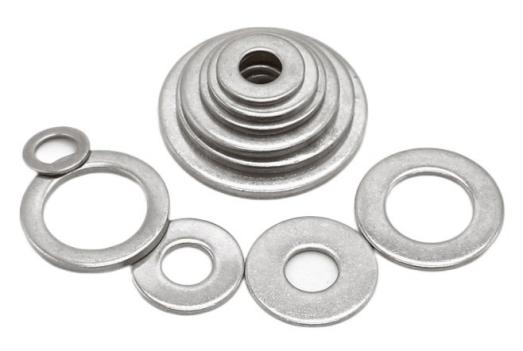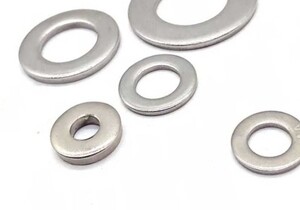What are the Distinct Functions of Various Washers
Body
Washers play a crucial role in bolted connections, but not all such connections necessitate their use. Bolted assemblies employ various types of washers, including flat washers, spring washers, or a combination of both. Let's delve into the distinct functions of these washers:
Flat Washers:
Protection of Substrate Surfaces
Bolts often have uneven surfaces on their heads, which can damage the substrate when tightly fastened. Flat washers come to the rescue by minimizing substrate surface damage caused by the bolt head. They act as a buffer between the bolt head and the substrate.

When frequent disassembly is required, flat washers protect the surfaces of connected components from scratches. Placing flat washers at the nut or bolt head can safeguard precision-machined surfaces from unwanted abrasions.
Precise Friction Coefficients:
In situations where precise friction coefficients are essential, bolt manufacturers provide bolts, nuts, and washers as a matched set. Manufacturers treat nuts and washers accordingly to maintain a consistent coefficient of friction between them. This ensures optimal performance and reliability in specific applications.
Prevention of Substrate Sinking:
When bolts are tightened, they generate axial forces. Excessive axial force, especially on soft and thin substrates, can lead to substrate sinking or deformation. Flat washers effectively reduce substrate sinking by distributing the load evenly.
The pressure transmission in bolted connections gradually expands like a trumpet, resulting in reduced compressive stress on the contact surface of connected parts. Adding a flat washer helps alleviate this compressive stress.
Spring Washers:
Increased Friction:
Spring washers primarily serve to provide extra force to the nut once it is tightened, enhancing friction between the nut and the bolt. This feature prevents the loosening of fastening bolts due to equipment vibrations during operation.

Prevent Loosening and Enhance Pre-Tightening Force:
Spring washers offer anti-loosening capabilities and increase pre-tightening force. However, flat washers do not possess this function. They are suitable for connections that rely on compression to generate friction for power transmission. Nevertheless, it's important to note that spring washers may not be effective in high-preload or critical connections.
For electrical connections, spring washers can still help prevent complete loosening, particularly when the connection has already started to come loose.
Compensating for Stress Relaxation:
In cases where bolt clamping length is limited, and bolt stress relaxation is a concern, spring washers can compensate for stress relaxation, helping maintain the desired clamping force.
When Can Washers Be Omitted:
Flange Face Nuts or Bolts:
When using flange face nuts or bolts, the larger contact area inherently increases the contact surface and reduces compressive stress. In such scenarios, washers are typically unnecessary.
Shear Stress Bolts (Reamed Hole Bolts):
Shear stress bolts, which do not require high preload and do not bear axial forces during operation, typically do not require washers. The bolt holes are often small, and the nut or bolt head's bearing surface is generally ample to support the load without reducing compressive stress.
In conclusion, the choice of washer – flat, spring, or none – depends on the specific requirements of the bolted connection and the materials involved, ensuring that the connection functions reliably and safely.









Comments